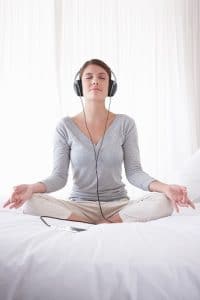Here Are Some of the Top Benefits of Sound Therapy
Did you know that sound has been inextricably linked to health and healing for millennia?
The History of Sound
Here’s a brief history of sound therapy:
- The earliest record of sound being used as a healing tool dates back more than 40,000 years to the Aboriginal people of Australia.
- In Greek culture, Pythagoras, known as the “father of music,” discovered musical intervals and used sound and harmonic frequencies for healing. In fact, he was the first to prescribe sound as medicine.
- Singing bowls found their origin in Mesopotamia more than 5,000 years ago. The cultures of Tibet, Nepal, and India have singing bowls in their history too, dating back roughly 2,000 years.
Today, there are many types of sound therapy and music therapy. Sound healing (also called sound bathing) makes use of Tibetan singing bowls, crystal bowls, gongs, tuning forks, bells, drums, and more, to calm the mind and spirit.
About Sound Healing

Although research is still new, studies suggest this kind of sound therapy promotes relaxation, helps to boost mood, and may even provide some pain-relieving benefits.
You’ll find sound healing offerings in most major cities. One Southern California sound bathing duo named Michael and Jahna combine ancient Tibetan singing bowls, guitar, mindfulness, song, and ethereal vocal toning to create an impactful sound bath. According to Jahna Perricone, participants report experiencing a state of greater cohesion, clarity, relaxation, inspiration, and creativity, after a sound bath.
While observational studies have shown certain benefits of sound therapy, exactly how it works remains a bit of a mystery. Sound healing practitioners believe that our bodies contain different energy frequencies.
Sonic frequencies are thought to reattune these energies when they’re “off.” It’s also believed that basking in the bath of sound may impact brain waves to promote deeper states of relaxation.
4 of the Top Benefits of Sound Therapy
Recent research has indicated several physiological and psychological benefits from sound healing.
- Stress Reduction
A recent study involving 105 participants measured heart rate variability (HRV) parameters after a 40-minute Himalayan singing bowls sound bath meditation. A trend showing overall relaxation and statistically significant reduction in heart rate were observed.
The researchers concluded that the physiological measurements “indicated a consistent reduction in heart rate throughout the meditation and a reduction in overall sympathetic tone and an increase in parasympathetic tone.” Sympathetic tone refers to the sympathetic nervous system, which is typically engaged with high activity and stress. The parasympathetic tone refers to the parasympathetic nervous system, which is in play during times of rest, repair, digestion, and relaxation.
The stress-reducing effects of sound therapy may help promote healthy blood pressure. A study examining Himalayan singing bowls as an adjunct therapy to relaxation showed healthier blood pressure levels amongst participants post-sound bath.
Another study from 2019 looked at heart rate variability with two different forms of relaxation – Himalayan singing bowls and supine (lying flat) silence. Both groups achieved relaxation, but the group that participated in a 20-minute session of Himalayan singing bowls had stronger markers of consistent relaxation and stress reduction, over the other group.
It’s not all singing bowls though! A 2015 study that focused only on gong baths showed that participants found the sound vibrations healing or relaxing.
- Boosts Mood and Well-Being
An observational study of 62 participants exposed to sound healing via a singing bowl meditation showed that participants experienced less tension, anxious feelings, fatigue, and low mood after the meditation. Additionally, a feeling of spiritual well-being significantly increased across all participants.
- Reduced Pain
In the same observational study, participants reported reductions in pain. Specifically, the group aged 40 to 59 who were new to this type of healing meditation showed the largest reduction in pain scores.
- Potential Immune Boost
A study on music therapy showed markers of boosted immune function in active participants. These participants engaged in a 30-minute session where they played various percussive instruments and sang. It’s believed that a similar effect occurs when sound bathing, especially in groups that actively make sound along with the sound healing instruments.
A Final Note
Perhaps the best way to fully understand the relaxation benefits of sound healing is to experience it firsthand. With all the promising benefits researched so far, it appears there’s nothing to lose from participating in a sound bathing session except possibly stress, a low mood, and pain!
At BrainMD, we’re dedicated to providing the highest purity nutrients to improve your physical health and overall well-being. For more information about our full list of brain healthy supplements, please visit us at BrainMD.
- Here Are Some of the Best Tension Release Exercises to Help You Feel Your Best! - April 17, 2024
- Foodscaping: How to Grow Healthy Foods In Your Own Garden! - April 12, 2024
- Eat Your Fruits and Veggies (Don’t Drink Them) - March 29, 2024




Might’ve been Tony Robbins or Jack Canfield-suggestion; so now part of my daily morn login includes Listening to Music, songs that inspire, motivate, calm; center, ground me. It’s a newer habit i’ve adopted; it feels Soothing, or like fight song-motivating. Your article resonates Much w what i’m already doing. I am very thankful for this Beautiful article. thk u
Hello Teresa, I’m just seeing this — a year later! Sorry that I missed it. I love that you start your day with music, and I’m so heartened to know you found value in this article. Music is indeed healing for me too!